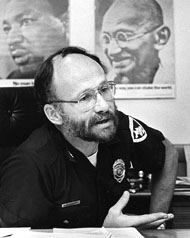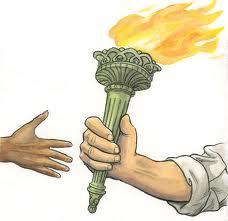PASSING THE TORCH. Is there a way to sustain excellence in policing? Which police departments are successful in continuing excellence and training leaders who then go out and continue the model of excellence?
A recent document by Alan Youngs got me thinking about my own experience in Burnsville, Minn. and Madison, Wisc. I also should mention the first department I joined in Edina, Minn. Although a college degree was not required, Chief Wayne Bennett set the stage for all of us by highlighting the importance of both competence and excellence in the delivery of police services. The expectations of one’s leader makes a big difference on how we perform.
But first, let’s look at what Alan Youngs has to say about the police department in Lakewood, Colo.
+++++++++++++++
Leadership Development Creates Chiefs of Police
— Alan Youngs —
“Leaders don’t create followers, they create more leaders.” Tom Peters, management consultant
In the world of college football, the University of Southern California is known as “Tailback U.” That nickname was created to reflect the steady stream of top rated tailbacks that have populated the ranks of the USC football squads over the years. If the names Mike Garrett, Ricky Bell, Charles White, Marcus Allen, Reggie Bush and LenDale White sound familiar, keep in mind that they all came from “Tailback U.” If there is an equivalent to “Tailback U” in the world of law enforcement, the honor would surely go to the Lakewood (CO) Police Department. Call it “Chief of Police U.” if you will. Though modest in size and budget, LPD has been the breeding ground of 63 chiefs of police since it’s founding in 1970.
Is there something in the water in Lakewood that spawns chiefs of police? Is the thin air of the nearby Rocky Mountains somehow responsible for creating excellence in the ranks of the local police department? Not exactly.
To understand the culture that produces so many chiefs of police from within its ranks, one must go back to the beginning of the department. The Lakewood Police Department was founded in 1970, shortly after the City of Lakewood – a fast‐growing suburb of Denver – was incorporated. This was right on the heels of the tumultuous ‘60s that had been marked by an unpopular war that continued into the 70s, civil unrest, and race riots in places like Detroit and Watts (Los Angeles). The Democratic Convention of 1968, held in Chicago, was deeply scarred by riots that to some degree may have been exacerbated by police misconduct that some pundits referred to as “police riots.” In short, police departments at the time suffered from unpopularity and a waning sense of self confidence.
In the late 1960s a presidential commission conducted a study on how to make law enforcement more professional. Lakewood’s city fathers, along with newly appointed Director of Public Safety (aka chief of police) Ron Lynch embarked on a bold and daring (some called it “radical) experiment to create the police department of the future. At the core of the experiment was the requirement that all Lakewood Police Agents must have a four‐year college degree. Through the years the “Lakewood experiment” adapted to its successes and failures, in some cases reverting back to the model of a more traditional police department. For instance, they did away with the controversial blue blazer and necktie “uniform” that had made the agents indistinguishable from the civilian population, and reverted back to the traditional police uniform. What did not change, and what lies at the heart of the U. of Chiefs of Police, was the requirement for a four‐year college degree. Coupled with an unflagging desire to create and promote excellence, LPD flourished.
Current LPD Chief Kevin Paletta recently reflected on why an astonishing members of its ranks have been hired elsewhere as chiefs. “Chiefs were sought from Lakewood’s ranks because of their educational requirements, their reputation for professionalism, their innovation, and their adherence to the highest standards of integrity and character,” Paletta noted. “Other departments wanted a chief who promoted and modeled Lakewood’s culture of excellence. The demand for Lakewood‐style leadership grew out of the successes of those early chiefs.“ Word spread quickly about the culture at Lakewood. Lakewood began attracting the best police officers from all over the country. If you wanted to work for one of the best police departments in the 1970s and 1980s, you wanted to work for the Lakewood Police Department. Success breeds success and a culture of excellence was created and sustained,” Paletta said. Today, one in every 10 Lakewood officers goes on to become a chief. Understandably, it is not difficult for Lakewood to recruit the cream of the crop.
James O’Dell, who was hired by Lakewood in 1970 and went on to become the chief in Kettering, OH, believes that one key element above all others set Lakewood apart from the rest. “Courage,” he said. “They were not afraid to try new things.” Chief O’Dell linked courage with “a healthy emphasis on education. …The agency made sure employees mastered interpersonal relations, communications, and customer service skills. …Lakewood became the melting pot of lateral entry recruits from across the country. These new hires brought so many different perspectives to the table. …Lakewood was not afraid of failure…”
Lakewood intentionally set the bar high when the department was founded, and the bar is as high today as it was in 1970. The department continues to innovate but does not lower its standards when an innovation fails. Persistence, high ethical standards, education, and an unyielding demand for excellence are essential elements in creating a culture that consistently produces police officers who are able to carry out their duties professionally and to grow and mature in their profession in order to lead others. In producing so many police executives and officers of high quality, LPD has proven that individuals will rise to the level of expectation presented them. Bringing a police department up to a level of excellence requires leaders who, as Stephen Covey says, work on the system not just management who work in the system. Commitment to higher standards at time of employment, training inside and outside the organization and expectations of integrity and high ethical values are elements of a model that has worked for the Lakewood Police Department.
[To read the full article, CLICK HERE.]
+++++++++++++++++++++++
Reading this article by Youngs and the Futures Working Group, a collaboration between the FBI and the Society of Police Futurists, reminded me of the heady days of the late 1960s and 70s. It was a time when change was in our nation’s air and it affected many of us, the Young Turks of policing.
My contribution to this era was to become the second police chief in Burnsville, MN. It was a small department in a growing suburb of Minneapolis. I was 30 years old with a lot of big ideas from eight years as a beat cop and detective, a newly minted bachelor’s degree in hand, and the newly-released report of two national presidential commissions reverberating in my head.
In Burnsville we, like Lakewood, changed to blazer-style uniforms, required a 4-year college degree, and attracted high-quality candidates. In Burnsville, and when I went to Madison, we recruited with these slogans:
- “Join the OTHER Peace Corps.”
- “Train to Leave: Join Our Management Training Program.”
- “You don’t like cops? Join Them and Change Them!”
Today Burnsville and Madison, like Lakewood, remain excellent police departments that are diverse, well-educated and trained, controlled in their use of force, honest, courteous, and connected to their communities.
A recent conversation with officials in Burnsville can easily identify 30 former officers that have left the department and moved into top police leadership positions. In Madison, we experienced something different: officers stayed with us, embraced the dream, expanded their education beyond the Bachelor’s level at the University of Wisconsin, and stayed for 30 years.
You can read more about my journey, the steps necessary to improve our nation’s police, and sustaining excellence HERE.



David, the total is now 69. Thanks, Regards, Alan Youngs
LikeLike
That’s great! Thanks for the update, Alan! Do you know of any more “Lakewoods” out there?
LikeLike
Lakewood may be good at producing police chiefs, it’s too bad that they stink at policing. Been a resident for 4 years and they fail on many levels, one in particular is being proactive against crime and putting huge amounts of resource efforts into traffic and minor offenses. Denver PD has a better handle on crime prevention. I agree with Tamara Davies: LPD has “inadequate, deficient, and deliberately indifferent policies, procedures, and customs”. Thank god they have a great chief though..
LikeLike
Yup. It ain’t easy out there, but a captain in Kalamazoo had an “aha” moment when he remembered the “golden rule” his mother taught him. Change can happen, but we in America have a long row to hoe in changing today’s dominant warrior ethos amongst our nation’s police.
LikeLike